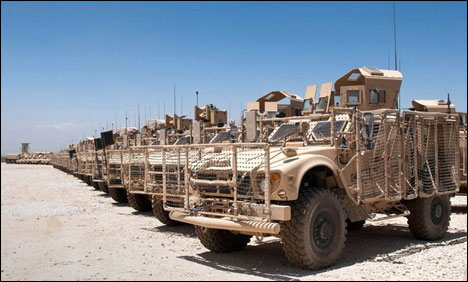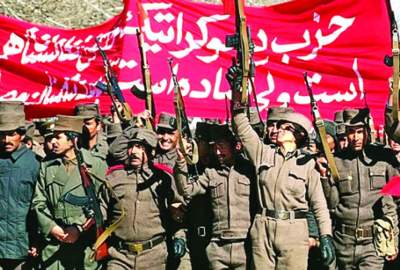The Pentagon wants to keep its $80 billion war chest even though most or all U.S. troops are to withdraw from Afghanistan by the end of this year, officials said.
“Overseas contingency operations” funds are separate from the main Pentagon budget and have financed wars in Afghanistan and Iraq and counter-terrorism efforts elsewhere for more than a decade.
About 33,700 U.S. troops remain in Afghanistan and the bulk of the force is due to depart by December.
The Obama administration hopes to keep a small contingent of up to 10,000 troops in the country beyond 2014—if the Afghan government signs a bilateral security agreement.
In years past, administration officials predicted that war funding would decline significantly with the planned pullout of American forces from Afghanistan.
But instead, the Pentagon has used the category to finance maintenance and other items that would otherwise be slashed under automatic budget cuts.
Unlike the main base defense budget, the war funding is not subject to the mandatory spending limits enacted by Congress, known as sequestration.
Both the Pentagon and lawmakers last year moved about $29 billion in funding out of the base budget to the overseas contingency fund (OCO), as a way of countering the effect of the automatic budget cuts.
This practice has “largely offset the cuts to the base budget from sequestration,” according to Todd Harrison of the Center for Strategic and Budgetary Assessments, a Washington think tank.
But if the war funding drops dramatically after the U.S. exit from Afghanistan, the Pentagon could face a major shortfall in coming years, he said Monday in a teleconference.
“That this is a pretty dangerous situation for DoD to be in, with being so heavily dependent on the OCO funding ... because that funding stream could disappear quickly,” he said.
The proposed main defense budget for 2015 is $575 billion, less than the peak in military spending of $691 billion in 2010 but still far beyond the 2001 budget of $316 billion.
(Japan Today)
“Overseas contingency operations” funds are separate from the main Pentagon budget and have financed wars in Afghanistan and Iraq and counter-terrorism efforts elsewhere for more than a decade.
About 33,700 U.S. troops remain in Afghanistan and the bulk of the force is due to depart by December.
The Obama administration hopes to keep a small contingent of up to 10,000 troops in the country beyond 2014—if the Afghan government signs a bilateral security agreement.
In years past, administration officials predicted that war funding would decline significantly with the planned pullout of American forces from Afghanistan.
But instead, the Pentagon has used the category to finance maintenance and other items that would otherwise be slashed under automatic budget cuts.
Unlike the main base defense budget, the war funding is not subject to the mandatory spending limits enacted by Congress, known as sequestration.
Both the Pentagon and lawmakers last year moved about $29 billion in funding out of the base budget to the overseas contingency fund (OCO), as a way of countering the effect of the automatic budget cuts.
This practice has “largely offset the cuts to the base budget from sequestration,” according to Todd Harrison of the Center for Strategic and Budgetary Assessments, a Washington think tank.
But if the war funding drops dramatically after the U.S. exit from Afghanistan, the Pentagon could face a major shortfall in coming years, he said Monday in a teleconference.
“That this is a pretty dangerous situation for DoD to be in, with being so heavily dependent on the OCO funding ... because that funding stream could disappear quickly,” he said.
The proposed main defense budget for 2015 is $575 billion, less than the peak in military spending of $691 billion in 2010 but still far beyond the 2001 budget of $316 billion.
(Japan Today)
Source : Afghan Voice Agency (AVA), International Service







